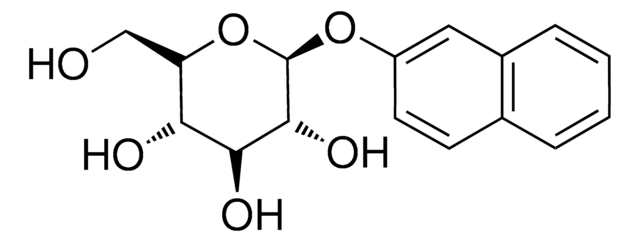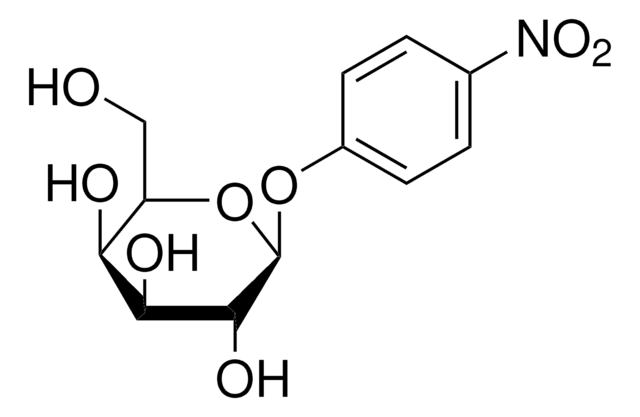B7877
6-Bromo-2-naphthyl β-D-glucopyranoside
≥99% (TLC)
Synonym(s):
6-Bromo-2-naphthyl β-D-glucoside
About This Item
Recommended Products
Quality Level
form
powder
solubility
pyridine: 50 mg/mL, clear to slightly hazy, colorless to faintly yellow
storage temp.
−20°C
SMILES string
OC[C@H]1O[C@@H](Oc2ccc3cc(Br)ccc3c2)[C@H](O)[C@@H](O)[C@@H]1O
InChI
1S/C16H17BrO6/c17-10-3-1-9-6-11(4-2-8(9)5-10)22-16-15(21)14(20)13(19)12(7-18)23-16/h1-6,12-16,18-21H,7H2/t12-,13-,14+,15-,16-/m1/s1
InChI key
NLRXQZJJCPRATR-IBEHDNSVSA-N
Looking for similar products? Visit Product Comparison Guide
Related Categories
Application
Biochem/physiol Actions
Storage Class Code
11 - Combustible Solids
WGK
WGK 3
Flash Point(F)
Not applicable
Flash Point(C)
Not applicable
Personal Protective Equipment
Choose from one of the most recent versions:
Certificates of Analysis (COA)
Don't see the Right Version?
If you require a particular version, you can look up a specific certificate by the Lot or Batch number.
Already Own This Product?
Find documentation for the products that you have recently purchased in the Document Library.
Articles
Probiotics exhibit an inhibitory effect on pathogens, help prevent chronic intestinal inflammatory diseases or atopic syndromes, and support the immune system.
Probiotics exhibit an inhibitory effect on pathogens, help prevent chronic intestinal inflammatory diseases or atopic syndromes, and support the immune system.
Probiotics exhibit an inhibitory effect on pathogens, help prevent chronic intestinal inflammatory diseases or atopic syndromes, and support the immune system.
Probiotics exhibit an inhibitory effect on pathogens, help prevent chronic intestinal inflammatory diseases or atopic syndromes, and support the immune system.
Our team of scientists has experience in all areas of research including Life Science, Material Science, Chemical Synthesis, Chromatography, Analytical and many others.
Contact Technical Service








